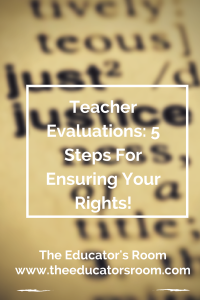 The following article is from the “New Teacher Bootcamp” archives from the site. Each article is meant to not only empower new teachers but to let them know they are not alone in their struggles. Join us each week for new articles dealing with everything a new teacher would want to know.
The following article is from the “New Teacher Bootcamp” archives from the site. Each article is meant to not only empower new teachers but to let them know they are not alone in their struggles. Join us each week for new articles dealing with everything a new teacher would want to know.
Every year teachers around the country go through the one thing that can determine their livelihood for years to come- teacher evaluations. In some states tenured teachers are only evaluated once every couple of years while in other states, every teacher is evaluated every year. Through these evaluation tools teachers are rated on their knowledge of pedagogy, use classroom management and their interactions with their students. However in recent years, teacher evaluations have changed with more districts applying for waivers from the Bush era, No Child Left Behind Law making the new evaluation tools not only confusing but more tedious to implement-especially on the teacher level. So whether you are a veteran teacher or a new teacher there are questions about how teachers can protect their livelihoods with evaluation tools constantly changing.
The first step to protecting your ‘ teaching livelihood’ is understanding what these various tools look like in your state and to understand what constitutes an evaluation. Most evaluations consist of several walkthroughs visits to your classroom and a combination of announced & unscheduled visits by your evaluator. These visits can last anywhere from 10 minutes to the entire class period and largely consists of the evaluator observing you (and the children’s) actions in your class period.
As a new teacher, it’s equally confusing learning exactly what an evaluator is observing while in your class . Making the visit more intimidating is knowing that if you do not do everything right – your career may depend on it. To make matters even worse, evaluations are not only going to be based on what an evaluator saw in your classroom but they are tied to your children’s academic performance on standardized tests! While no administrator can see all you do in the 180 days you are in the classroom, it’s crucial that teachers not only understand the process but how to protect themselves during the entire evaluation period . So instead of stressing about your upcoming evaluation and ‘giving up’ due to the stresses of the classroom, try these 5 tips to keep your cool and come out the victor in the realm of evaluations:
- Become knowledgeable of the tool(s) the evaluators uses while observing you. Every state has different tools that they use to determine if an educator is effective (or not). Take a couple of hours and go to your state department’s website and begin downloadingALL the forms for your evaluations. Read them and become familiar with exactly what each Teacher Domain details. Make sure you take an honest look at your classroom and recognize areas of improvement and areas of strengths.
- Keep a portfolio that highlights every domain evaluated on the evaluation so that you can have evidence of your teaching. Most evaluations have domains where the evaluator grades your ability as a teacher. Since most evaluators can not observe every domain in the time their in the classroom, develop a system where you keep track of what you are mastering in the classroom. For example, get a plastic hanging file and label each file with the domain from your evaluation. Once a week look over the domain and add work (worksheets, parent conference logs, tutorial sign in sheets, professional development registrations that you’ve attended, etc) that can prove you have mastered that domain. When you go in (or before) for your summative conference with your evaluator, take that hanging folder with you and show how effective you are in the classroom.
- Ask questions at your pre-conference. Every Principal is required to orientate every teacher about the evaluation. Take that time to ask questions. Make sure you are clear about each component and what your evaluator is looking for. If you still have questions, schedule a meeting with your principal so that you can be confident that you are ready.
- Don’t be afraid to challenge inconsistencies or untruths in your evaluation. While evaluations are meant to be objective there are areas that can be subjective. With that in mind if you are graded low in an area but you KNOW it’s not accurate- fight it. Bring in your portfolio from number 2 full of student work and other evidence that will prove your pedagogical ability. Remember it’s always better to have more evidence than needed.
- Know your rights. This is probably the most important rule for getting through your evaluations. Learn what steps have to occur before you can be graded low or put on a professional development plan. Make sure that all steps of the evaluation are properly followed to ensure that your (the teacher’s) due process has been respected.
In the end, teacher evaluations are tricky but if you follow these five rules you should be able to navigate through them and come out as the effective educator you are. Now tell us how have you managed through your evaluation in the past?





